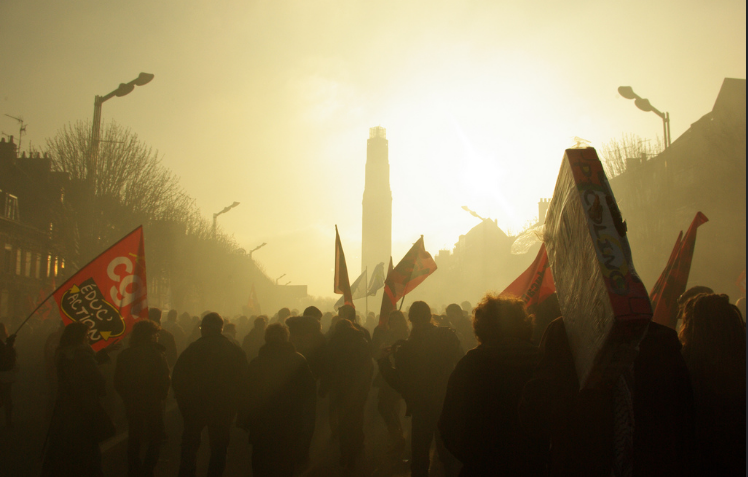Striking: The Habit Must Go in The Land of Liberté, Egalité, Fraternité!


On the gray Parisian morning of March 3rd, Mrs. Dupont came down for breakfast to discover that there was no newspaper to accompany it. This was because the book branch of the Confédération générale du travail (CGT) union was on strike and refused to print the national dailies. Frustrated, she set off for work. Stopping at her usual gas station, she found that it was closed. Members of the CGT had also blocked the refineries. Mrs. Dupont travelled to two other stations and waited for over an hour before she could refuel and go to work. However, Mrs. Dupont is not the only French person faced with the consequences of the CGT’s discontent in the face of the “Loi Travil,” or labour law, that the socialist government is trying to pass.
Historically, strikes have been a tool employed by workers to achieve more social rights. The right to strike in itself has also changed since the “Ollivier” law of 1864, whereby coalitions were allowed and the right to strike was recognized. Today, the right to strike is asserted even in the preamble of France’s Constitution, issued in 1958 with the coming of day of the Fifth Republic. Since then, laws concerning the issue have stated, among others, the obligation for strikers to negotiate with their employers after announcing a future strike, the protection of nuclear power facilities to ensure the continuity of service in case of a strike, and the maintenance of minimum aviation service in the event of a strike.

As tools to put pressure on governments, strikes have sometimes helped workers acquire more liberties. For example, general strikes led to the introduction of paid vacation time in 1936 and the creation of the “social security” in 1945. Today, strikers from the CGT are hoping to protect some of the rights they achieved by blocking any modification made to France’s “Code du Travail”. The ensemble of laws in the Code address the rights and duties of employers, employees and institutions related to life in companies. France’s government recently proposed changes to the Code du Travail concerning such elements as the definition of an economic lay-off, the conditions regarding the requisitioning of a worker for extended hours, daily working hours, and financial contributions of “detached” workers. These proposed amendments caused an uproar in the CGT, which counts 700,000 members out of 28 million workers in France and whose discontent is based on misinterpretations of some of the proposed modifications. Indeed, the CGT’s website indicates that workers may say “adieu” to the remuneration of their extra working hours, but the new law stipulates on the contrary that extra hours lead to “an increase in salary or […] a compensating time off equivalent to the extra hours worked.” The website furthermore addresses the issue of company referendums, open to all employees, which may occur if the company fails to secure enough of union members’ signatures to approve a contract. The CGT fears this may put pressure on workers to conform to employers’ wants, but with only 7-8% of French employees in unions, it is unlikely this modification will lead to any harm. Several other issues are addressed by the CGT with this same defamatory habit and by the group’s leader Philippe Martinez.
This has exacerbated tensions between French workers and the government, leading to violence and good shortages. CGT partisans have disrupted oil refineries, nuclear power stations, and transportation. There have been instances of violent encounters with the police, with protesters burning police cars and vandalizing shops. In the midst of this mayhem, some may question whether these strikes are a manifestation of greater instability in the country as a whole. I believe it is not so. France has already faced large-scale and violent strikes in the face of economic difficulties, vulnerability of employers and public authorities, and organized workers’ unions.
Although this situation is unfortunately not out of the ordinary in France, the way discontent is manifested is truly problematic. In a stable democracy, it should not be permitted that a few citizens take others “hostage” by preventing them to go to work and impeding the operation of their businesses or the quality of their daily life. As French philosopher and Académicien Jean-François Revel explained, “Violence in itself does not have a revolutionary character. Historically, […] it rather served to repress and oppress than liberate.” (Ni Marx ni Jésus, 64)
